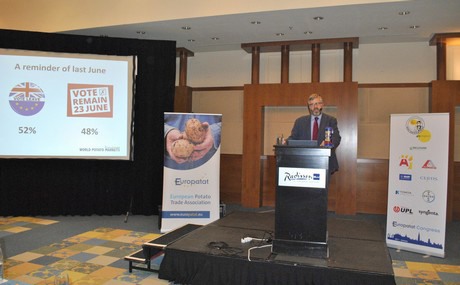
Cedric entered with a piggy bank, click here. "There isn’t much money in it yet", he mentioned. Nevertheless the real question is how that would develop over the next six months.
Elections
However, last week’s general election in the UK has made the situation more uncertain. Prime Minister Theresa May was hoping to gain a majority by calling early elections, but she failed to do so. She now needs to form a coalition with the Northern Irish Democratic Unionist Party (DUP) to govern. The DUP wants no changes to the current Republic of Ireland and Northern Ireland border, or the trade arrangements. The Conservative Party, on the other hand, wants to control immigration, meaning the UK cannot remain part of the EU Single Market or the Customs Union. The general election has likely made the EU’s position on Brexit stronger. The EU also appears stronger after pro-EU results in recent French and Dutch elections.

The UK is one of the largest potato consumers in the world. Although the amount of fresh potatoes is declining, that of processed potatoes and chips have shown a slightly increasing trend. According to Cedric, the UK imports products worth 575 billion euro a year, while exports amounts to 380 billion euro. However, the weaker pound has made importing to the UK more expensive. This year, the pound is 12 per cent weaker than last year, and even 17.5 per cent down on two years ago.

Issues
If the UK wants to leave the EU Single Market and Customs Union, it will either have to negotiate a new arrangement, or EU/UK trade will have to occur under WTO rules. This would impact the imports much more than the exports. One of the issues the UK has to bear in mind, is that the UK leaving the EU would mean they are also leaving the Common Agricultural Policy. The Tories have committed to preserving support payments until 2022. This could mean EU reforms would happen before UK reforms. The UK will also have to take care of regulations that are now covered by the European Union. However, these regulations will probably have to comply with the EU if the UK wishes to do trade with the EU.

Opportunities
People in the UK will continue to need to eat, meaning that the UK will continue to be a market for EU suppliers. The UK might also eventually be able to trade more freely with other parts of the world. Brexit may provide opportunities for EU countries operating in the UK. Or, as Cedric said: “Forget Brexit. The real potato opportunities are outside of Europe.” He illustrated these words with a graph showing the world’s population by region. Europe’s and the EU’s population are overshadowed by those of Asia, Africa, Latin America and North America. And according to the UN, those populations will only increase in coming years, as opposed to that of Europe, which will stagnate. It’s therefore estimated that the global consumption of potatoes will increase.
Brexit is still very likely to happen, but the chances of a ‘Breturn’ have also increased. What’s more, a Brexit with similar arrangements to now is more likely, after last week’s general election.










